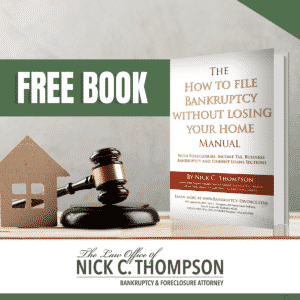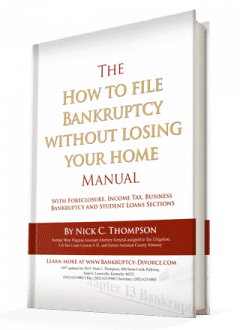Foreclosure Defense Strategies
A defendant/homeowner in a foreclosure is required to file an answer within 20 days after being served with a foreclosure complaint or a default judgment may be entered and the property may be sold within 90 days. It is crucial to seek professional assistance from an attorney or credit counselor to navigate this process effectively. Most homeowners either
- fail to file an answer and lose by default or
- file an answer and dont know what defenses to assert or
- Admit that they are in default in an answer when they should use the foreclosure lawsuit to sue the lender. When the debtor files an answer he almost always later loses to a summary judgment motion by failing to plead a valid defense.
The Kentucky Foreclosure process and options
If the homeowner files a proper answer, discovery, and/or perhaps a bankruptcy, the homeowner may:
- win the lawsuit,
- have the lawsuit dismissed,
- the foreclosure process may take years or
- in a Chapter 13 the homeowner may catch up the mortgage and stop the foreclosure. In a Chapter 7 bankruptcy or Chapter 13 bankruptcy a discharge will avoid a deficiency judgments and 1099 income tax debt.
If you are delaying the foreclosure to sell the home or get a modification in the months or years it takes to foreclose, a homeowner often makes no insurance, property, tax, or mortgage payment. Sometimes the property goes back and eventually a Chapter 7 bankruptcy or Chapter 13 bankruptcy is filed so there are no deficiency or tax problems. You can build up savings that enable you to find other housing or sell the home in that time. A new mortgage at a normal interest rate is often possible 3 years after the sale. The Homeowner should defend the foreclosure and file Chapter 7. Otherwise, a mortgage company may collect the deficiency and the mortgage company will always file a 1099-c causing an income tax problem. Charging off the debt creates an income to the Debtor and a tax credit for the lender.
The Kentucky Foreclosure laws and options
Mediation is a defense that is available at the start of the case. Along with that are the affirmative defenses, and federal mortgage servicing laws which may not have been followed. If a foreclosure sale has been scheduled and the lender has won a default or summary judgment the only defense which tends to still exist is either filing bankruptcy or the very unlikely chance that jurisdiction is improper. There are over 120 different defenses and all the many programs to get your home our of foreclosure. But primarily the Chapter 13 option is the best.
Why is that option so good? First the mortgage lender is forced to accept payments. Second the court ordered stay stops a foreclosure sale. You can work on a mortgage modification during the Chapter 13 bankruptcy, or sell the home. Many people simply file the Chapter 13 as an answer to the foreclosure complaint. It is the quickest easy cheapest method to cure the default if you plan to keep the home. Your contract or “note” with the mortgage company allows them to add on the legal fees often at 350, 450 or 550 per hour for attorney fees. Delay filing the Chapter 13 and it may be impossible to catch up the mortgage because the legal fees and default have to be cured.
Chapter 13 Bankruptcy as a Foreclosure Defense
Chapter 13 is the primary tool that allows a homeowner to keep a home. A homeowner may take up to 5 years to catch up on the mortgage and may be able to strip (eliminate) a second home mortgage if there is no equity for the second mortgage. You may also be able to complete a mortgage modification by filing a Chapter 13 bankruptcy so you can take the time to complete a sale of the home or loss mitigation application.
Improper charges to the loan can be challenged by motions to deny the mortgage company’s claims and lawsuits may be brought against the mortgage company or servicer. A Kentucky statutory right or claim against a law firm or lender can often be litigated in bankruptcy court which is often more generous to debtors.
Chapter 7 Bankruptcy as a Foreclosure Defense
A Chapter 7 bankruptcy is a good option if you wish to surrender the home or if you are close to current on your mortgage and wish to keep the home. If it would only take a couple of months to catch up and the mortgage company will accept the payment the 4 months a Chapter 7 takes may give you that time.
Chapter 7 may also make the home affordable by eliminating other debts. Chapter 7 will temporarily delay foreclosure and eliminate the tax and deficiency liability if it is properly filed prior to the sale. In Chapter 7 you rarely lose property and wipe out unsecured debts that may be causing the problems with paying the mortgage. You can keep a substantial amount of equity in your home and other property. In Kentucky, you can have more than $23,000 in equity for a single person or $46,000 if a couple is on the deed. Even if a home eventually forecloses a bankruptcy trustee may be much better than a foreclosure in state court. With the state court, you may or may not be able to retain the state $5,000 dollar exemption in the property. In a bankruptcy sale the proceeds:
- go to the taxes and mortgages first
- then to the debtor
- then to any non-dischargeable debts such as child support and income taxes
- and finally to unsecured creditors and judgment liens.
In a state sale, the proceeds go to judgment liens before the debtor is paid. The debtor only keeps $5,000 in equity not the $23,000 exemption. The Debtor, his income taxes and Child Support are paid last if anything is left.
Bad Kentucky foreclosure defenses.
The Foreclosure defenses that do not work so well are:
Reinstatement and workout options.
These options normally may either take weeks or months. You can attempt a reinstatement, workout or modification while you defend the foreclosure or while you are in bankruptcy. But you normally don’t have the time to do these solutions if the house can be sold in 90 days. You are too late to file a bankruptcy or answer to the lawsuit and save the home after the auction happens. You just do not have the time.
The interest, penalties, and legal fees continue to add up. Sometimes they promise a workout but continue to foreclose. If the home is a bargain and worth what is owed at a reasonable rate it may be worth saving by obtaining a Reinstatement of the mortgage if you have the money and can afford to catch up the payments in a short period of time. In a workout you work with a Counselor to get the following:
- Forbearance – relief from making monthly payments for a period of time but at a cost to equity.
- Repayment or Reinstatement – plans to make up missed payments.
- Interest rate reduction.
- Reduction in loan balance (very rare) often only offered after litigation.
- If the bank refuses reinstatement or workout a 13 can force payments on the bank.
Mortgage modifications.
Most of the modification programs ended in Dec 2016. Over 90 percent of all mortgage modification applications fail. Banks often will agree to a temporary rate reduction but at a long term increase in the interest or amount paid back. Workouts eliminate the past due payments but places that amount back into the principle increasing the amount you owe. Governmental programs haven’t been successful and the new program HARP has had the same failures that HAMP had. There is no longer a right or requirement by the bank to do any particular program but if they do take an application they have to process it properly.
Short sales and deeds in lieu of foreclosure.
• Short sales.
You work with the lender to sell the property for less than the loan is worth. Very little benefit to you from this option over foreclosure. You are doing the work for the mortgage company and being forced out of the home early. You may still owe a deficiency, and it triggers an income tax debt from a 1099-C for the deficiency after doing the work. Finally, you are liable to lawsuits from the purchaser for property defects.
• Deeds in lieu.
You give the property to the lender prematurely. This has a very small benefit to you on the credit rating. Often it still leaves you with a deficiency and/or tax problems. However, sometimes the lender will waive the deficiency and may offer cash for keys option to help fund your move.
Just walking away.
This still leaves the homeowner liable for income taxes and the deficiency. If the property is condemned, there may be fines and other penalties for building and code violations. Always live in the home until the home is transferred by a deed to a new owner. Housing code violations can be a criminal matter. Even if you file bankruptcy and declare you are abandoning the home, you should keep the property occupied until the sale. The property remains yours until the sale. You can live there rent-free until the sale or rent it on a short lease or rental contract.
 Resources for Bankruptcy
Resources for Bankruptcy
Louisville Kentucky Bankruptcy Forms
Louisville Kentucky Foreclosure Defense
Real Estate Workouts • Avoiding Foreclosure
Problems with Loan Modification and Workout Agreements
Learn About Louisville Short Sales
If you are thinking about filing bankruptcy, don’t delay because timing is crucial. I am here to help you. So, contact my office right away to start the conversation. Nick C. Thompson, Bankruptcy Lawyer: 502-625-0905.


